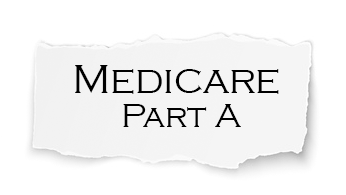What is Medicare Part A?
Medicare Part A is hospital insurance that includes coverage for inpatient care, skilled nursing care, home health services, and hospice care. Part A and B is sometimes called “Original Medicare” because it was the first parts of Medicare to be established by Congress.
To be eligible for Part A, an individual must be 65 years of age or older, or under 65 years of age and have a qualifying disability. Individuals who are under 65 years of age and have End-Stage Renal Disease (ESRD) are also eligible for Part A.
Part A is funded through payroll taxes and, sometimes, premiums.


What does Medicare Part A cover?
Medicare Part A covers several types of healthcare services, including:
- Inpatient care in a hospital or skilled nursing facility
- Home health care visits
- Hospice care
Part A covers these services on either a fixed fee basis or an approved fee schedule, depending on the type of care. Part A also covers some preventive services, such as annual wellness visits, flu shots, and various types of screenings. Sometimes, there may be limits or restrictions on how much of a service is covered.
To qualify for premium-free Part A coverage, most individuals will need to have worked and paid taxes in the U.S. for a certain number of years.
Reference source: Parts of Medicare
How do I qualify for Medicare Part A?
To be eligible for Medicare Part A, you must be:
- age 65 or older
- a US citizen
- a permanent resident of the US for at least 5 years
- qualified for Social Security benefits, or receiving Railroad Retirement Board benefits
Those who paid Medicare taxes while working may be eligible for premium-free Part A coverage. If you haven’t paid enough Medicare taxes, or if you haven’t worked enough and are ineligible for premium-free Part A, you may owe a monthly premium.
If you don’t currently qualify for premium-free Part A and need to purchase it, you will need to contact the Social Security Administration to find out the exact cost.
More information: Original Medicare (Part A and B) Eligibility and Enrollment

When can I enroll in Medicare Part A?
You can enroll during a 7-month period that starts three months before the month you turn 65, includes the month you turn 65, and ends three months after the month you turn 65. This 7-month window is referred to as the initial enrollment period.
If you miss this 7-month window, you can still enroll in Medicare Part A and B, but you may have to pay a late penalty. You may avoid a late enrollment penalty (LEP) if you qualify for a Special Enrollment Period (SEP).
You are automatically enrolled in Medicare Part A when you turn 65 if you are already receiving Social Security or Railroad Retirement benefits.
What are the benefits of Medicare Part A?
Medicare Part A is often referred to as “Hospital Insurance” since it covers medical costs related to hospital stays and care.
The following services and treatments are covered by Part A:
- Inpatient hospital care
- Skilled nursing facility care
- Hospice care
- Home health care
Note: Part A does not provide coverage for long-term care, custodial care, most dental care, cosmetic surgery, massage therapy, routine physical exams, eye exams, hearing aids, and other services not under the Medicare umbrella of care.
Depending on the type of Medicare treatment, Part A may have limits on the number of days of covered care. If you need more coverage than what Part A and B can offer, you may want to consider enrolling in a Medicare Advantage or Medigap Plan.

How much does Medicare Part A cost?
The cost of Medicare Part A depends on your individual circumstances. Typically, there is no monthly premium for those who are eligible for premium-free Part A. Although, those who are not eligible may have to pay a premium for Part A.
The premium amount will depend on the situation — if you or your spouse worked and paid Medicare taxes for at least 10 years (40 quarters) during your lifetime, you don’t have to pay a premium; there is no cost for Part A.
For those who are not eligible for premium-free Part A, your premium amount depends on the number of Medicare credits you’ve earned.
Besides the monthly premiums, you may have to pay an annual deductible, copayments, or coinsurance.
Click on the links below for the associated Medicare costs…
Inpatient Hospital Care
Skilled Nursing Facility Care
Hospice Care
Home Health Services
How can I get help to pay for Medicare Part A?
If you need help to pay for Medicare Part A and Part B premiums, you may be eligible for help. Depending on your income and financial situation, you may qualify for several programs, such as Medicaid, the Low-Income Subsidy from the federal government, or even state-level aid offered through your state’s Medicaid program.
You may also be eligible for financial help from organizations such as the Medicare Rights Center and the National Council on Aging, both of which help seniors who may not qualify for Medicare or Medicaid.
Finally, if you find that you can’t afford to pay your Part A premiums, you may qualify for a premium assistance program such as Medicare Savings Programs, which can provide assistance with paying your Part A premiums. To find out if you qualify, you need to speak to your state Medicaid office to find out if your state has a program available.

Final Note
Medicare Part A is a major component of Medicare that offers hospital and other medical coverage for people 65 and older or people who qualify based on a disability or certain health problems. Medicare Part A is an important part of health insurance coverage for those who qualify, and it is essential that you understand how it works and the various benefits it provides.
It is also important to understand if you need help to pay for Medicare Part A. Depending on your income and financial situation, you may be eligible for government programs and other organizations that provide help with Medicare Part A premiums. If you find yourself when you can’t afford Part A premiums, the Medicare Savings Programs may help.


